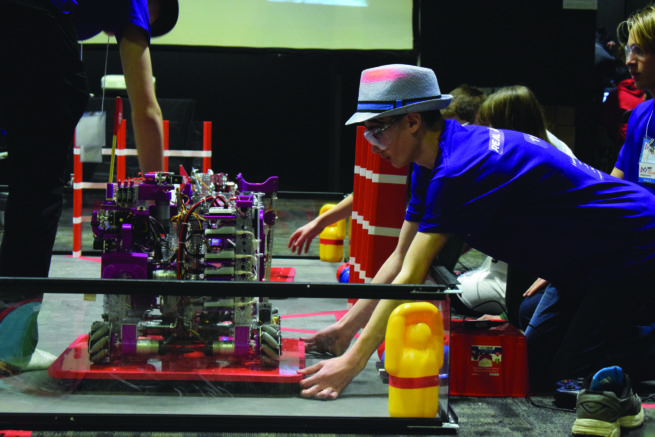December 17, 2018
The Young Edmonton Grants fund is helping one group of teenagers build science and technology skills
The second robot that 14-year-old Darien Piva and his friends created for a youth competition was able to build a wall with foam cubes and then lift a plastic statue over that wall and place it upright.
Built with several 3D-printed components, the robot advanced to the finals, a much better result than their first attempt, which placed sixth out of 25 teams. Much of their success was due to a grant from Edmonton Community Foundation’s Young Edmonton Grants (YEG) program.
“We had hit a dead spot,” says Piva, now 15. “We were basically out of money. [Afterwards] we just took off. Thanks to YEG for giving us this money. We really couldn’t have done it without you.”
Since 2011, YEG has encouraged youth activities and leadership through grants of $500 to $3,000 for projects initiated, led and organized by young Edmonton-area residents.
“Through this program, we get to see all the creative and engaged young residents putting their ideas into action,” says Cassandra Lundell, ECF’s community grants associate.
Youth aged 13 to 24 are eligible to apply with a partner school or registered charity. Grants are awarded by a youth committee, currently comprising members aged 17 to 24, but sometimes as young as 13.
The application by Piva’s team was accepted because, “it was a cool idea that we had not seen before,” says Emilia Housch, a youth committee member. “We see the benefits of teaching youth skills as well as it being something that they would enjoy.”

Piva understood the benefits by age 13. Keenly interested in robots — and in the disciplines of science, technology, engineering, and math (STEM) that power them — he became captain of a team of like-minded teenagers to compete in FIRST Tech Challenge Alberta, a local branch of an international youth robot-building competition.
FIRST Tech offers startup funding of US$300 and online access to resources and forums to aid students in designing and building robots. With their families covering costs for materials (about $3,000), team Real Virtuality first competed in the 2016-17 challenge. But that exhausted their funds.
By receiving an ECF grant of $3,000 in 2017, the team was able to build its robot, travel to community events to demonstrate it, and prepare its engineering book to record how the robot was designed, built and tested.
To receive another YEG grant in 2018, the team pledged to educate and support a younger demographic to build robots. In addition to constructing a robot for the 2018-19 FIRST Tech Challenge and building a portable “field” made of black mats and plexiglass for practising with the robot, they are helping 20 kids on three separate teams, some of whom compete in a junior league.
Those youngsters are “just so excited and so astonished when they see this basically, hunk of metal and plastic, moving all on its own,” says Piva. “They’re always like, ‘I wanna do that.’” Piva is eager to help because he knows STEM is vital to many fields, from medicine to manufacturing. Encouraging interest in it when people are young, impressionable and full of imagination and energy “allows them to grasp things easier, and it gives them a bit of a head start.”
Supported by two adult mentors, Real Virtuality’s current team members are aged 14 to 17.
Building robots is enjoyable, says Piva, because robots are “just really fun to be around. It’s like a friend that never argues with you.”
Fast Facts
• As of September 2018, YEG has granted more than $400,000 to about 200 groups
• Projects included an Indigenous storytelling event, an empowerment conference for young women and a juvenile diabetes fundraiser